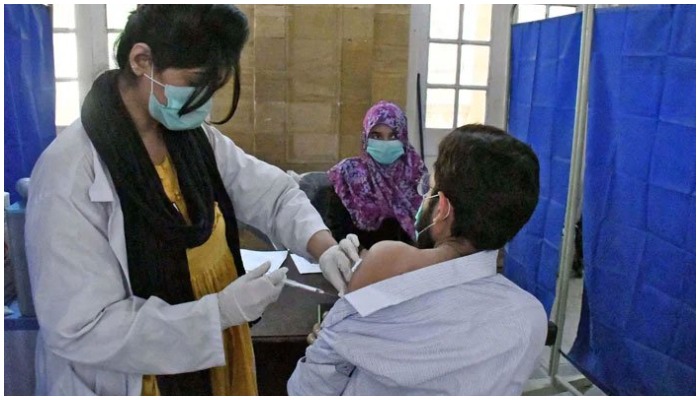New vaccine guidelines not applicable on those who got first jab before June 21
Health expert says a delayed 2nd dose of vaccine could provide greater immunity from COVID-19
June 23, 2021

- The govt has once again revised the decision to increase gap between vaccine doses to "avoid confusion and chaos at vaccination centres."
- Earlier, health officials had said a delayed second dose of vaccine could provide greater immunity from COVID-19.
- Those willing to get their 2nd jabs of Sinopharm, Sinovac vaccines will not be returned unvaccinated: authorities.
KARACHI: The federal government has once again revised the vaccine-gap guidelines to "avoid chaos and quarrels at vaccination centres," The News reported Wednesday.
Per the report, authorities Tuesday said those willing to get their second jabs of Sinopharm and Sinovac vaccines as per the previous guidelines and standard operating procedures (SOPs) would not be returned unvaccinated, while those having the first jabs of both the vaccines would be asked to come for the second dose after 42 days (six weeks).
“Instructions have been issued to the CVCs that those who come for the 2nd dose inoculation, based on previous SOPs must not be returned. All those who would arrive at CVCs after 3 weeks will be facilitated to save them from the inconvenience of repeat visit”, an official of the National Health Services, Regulations and Coordination (NHS, R&C) told The News.
The official, however, insisted that as per scientific data and advice from the experts, all those who had received the first dose should get the second jab six weeks apart.
Increased immunity
The health authorities had issued new guidelines for the administration of double-dose Chinese vaccines on Monday, directing that gap between two doses of Sinovac and Sinopharm vaccines should be 42 days instead of 28 and 21 days respectively, which resulted in suspicion and confusion among people, as many feared that increased gap between the two doses could deprive them of immune response of the vaccines.
On the other hand, health experts said there was no harm in increasing the interval between two doses of vaccines adding that even better immune response could be generated if the gap between the two doses was increased up to 56 days.
“International data suggest that better immunity can be achieved if the gap between two doses is increased up to 56 days. After that, immunity starts weakening and if the gap is more than 90 days, the first dose may become ineffective in providing the protection against the coronavirus”, Vice-Chancellor Health Services Academy Dr Shahzad Ali Khan told The News.
Dr Shahzad maintained that the decision to enhance the gap between two doses of double-dose Chinese vaccines was taken on the basis of international data, experts’ advice as well as keeping in view the gap in the supply of vaccines but added that Pakistan will have abundant vaccine stocks in August, which will ease pressure on the authorities.
Gap must not increase 90 days
Another expert and Vice-Chancellor of the University of Health Sciences (UHS) Lahore Professor Javed Akram also said there was no harm in increasing the gap between two doses of the vaccines but added that the gap should not be more than three months.
“There is no harm in increasing the gap of Sinopharm and Sinovac vaccines from three weeks to six weeks, as this will not deprive any person of the immunity generated by the first week. The gap between two doses, however, should not exceed 90 days”, Professor Javed Akram, who is the principal investigator of several vaccine trials in Pakistan, said.
Similar views were expressed by several other vaccinologists and infectious diseases experts but some epidemiologists said in order to avoid confusion and unrest among people, authorities should focus on streamlining the vaccine supplies instead of taking such steps.
“There is no data yet if extending the second dose to six weeks instead of four weeks increases the immunity. Until we get some data on the benefit of extending the second dose from four weeks, we need to correct vaccine supply problems and bring the schedule back to four weeks”, said Dr Rana Jawad Asghar, an eminent epidemiologist and surveillance system expert.
According to Dr Asghar, the whole vaccine issue is becoming confusing day by day for the general public.
“To keep the trust on vaccines, be truthful with the public, admit supply problems, assure negative impact will be minimized and come back to WHO recommended schedule ASAP”, he added.









